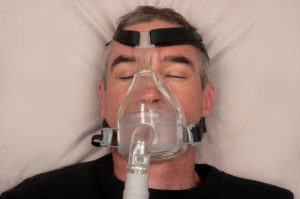 A recent study shows that it is possible to predict the onset of obstructive sleep apnea (OSA) in patients suffering with congestive heart failure. Using a simple questionnaire and pulse oximetry, researchers from Thomas Jefferson University have been able to predict obstructive sleep apnea in patients who have been hospitalized for congestive heart failure.
A recent study shows that it is possible to predict the onset of obstructive sleep apnea (OSA) in patients suffering with congestive heart failure. Using a simple questionnaire and pulse oximetry, researchers from Thomas Jefferson University have been able to predict obstructive sleep apnea in patients who have been hospitalized for congestive heart failure.
The implications of this study are huge because even though sleep disordered breathing is present in an estimated 70 percent of patients with congestive heart failure have, only about 2 percent are diagnosed and treated. Early detection and subsequent treatment of this disorder in patients with congestive heart failure will go a long way in improving ejection fraction, reducing acute heart failure and may even reduce readmissions and mortality.
Advertisement
The full details of the study are available in the Journal of American College of Cardiology: Heart Failure.
According to lead author Sunil Sharma, M.D., FAASM, who is also an Associate Professor of Pulmonary Medicine in the Sidney Kimmel Medical College at Thomas Jefferson University, traditional screenings are not always effective in patients with congestive heart failure. To offset this handicap, the team came up with a screening strategy that can be used on patients with congestive heart failure, during hospitalization, to detect sleep disordered breathing.
The strategy involved the use of the STOP-BANG Questionnaire. In this questionnaire, respiratory therapists asked consecutive patients admitted for congestive heart failure the following questions:
1. Do you Snore?
2. Are you Tired during the day?
3. Is there any Observed apnea (breathing difficulty)?
4. Is there high blood Pressure?
These four questions were asked of people who:
a) Have a Body mass index greater than 35
b) Are more than 50 years of Age
c) Have a Neck circumference of 40 cm or more
d) Identify their Gender as male.
Patients who screened positive in the STOP-BANG Questionnaire received a formal sleep consult during their hospital stay. As part of the consult, the patient underwent high resolution pulse-oximetry testing to assess the level of oxygen in the patient’s blood – oxygen desaturation index (ODI). Evidence of obstructive sleep apnea was calculated using the dips in oxygen levels throughout the night.
As a next step, patients with a high ODI were asked to undergo overnight polysomnography as an outpatient. A whopping 94 percent of those who did the polysomnography were diagnosed with sleep disordered breathing.
Advertisement
According to Paul J. Mather, M.D., FACC, FACP, Lubert Family Professor of Cardiology in the Sidney Kimmel Medical College at Thomas Jefferson University, patients with cardiovascular disease do not always have daytime sleepiness, heavy snoring and other traditional sleep apnea symptoms. In fact, according to the National Sleep Foundation, more than 18 million Americans have sleep apnea, and up to 80 percent of cases of moderate or severe OSA have gone undiagnosed despite adequate access to health care. This study gives cardiologists the option of a cost-effective clinical pathway to detect sleep disordered breathing while these patients are still in the hospital.
The team admits that more research is needed in the future to see if early detection and treatment of obstructive sleep apnea can reduce readmissions and mortality in patients with congestive heart failure.
Also Read: Obstructive sleep apnea can cause brain damage: Study
Sources:
http://www.eurekalert.org/pub_releases/2015-09/tju-stp090815.php
